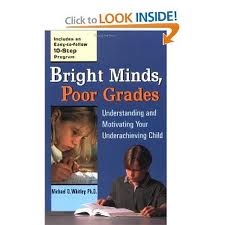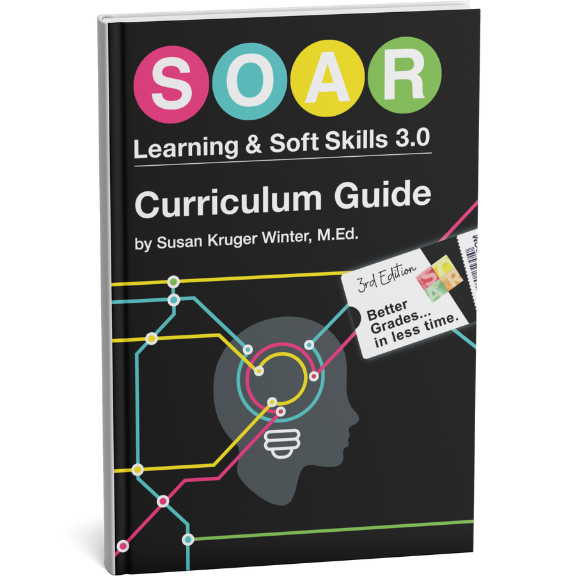How to Improve Motivation
Can you think of a few times in your life when you felt particularly good about yourself…when your “self-esteem” meter was on the rise?
What inspired those feelings?
Every one of those memories is likely tied to an accomplishment you made in some way, shape, or form; a result of effort and work on your part. They were also likely tied to a strong relationship with another person.
Work + Love
In response to many comments from parents and teachers that are frustrated by students who are not motivated or working to their potential, I have been reading a book called “Bright Minds, Poor Grades,” by Dr. Michael Whitley, a clinical psychologist.

His book is filled with great insights and good information. However, I believe the most powerful information is his description of the basic, underlying problem of underachievers.
According to Dr. Whitely, an “underachieving” child is lacking emotional meaning in life. Specifically, he has an inability to find meaning or satisfaction in work and/or an inability to sustain love relationships.
To prove his point, I’ll examine the list I made when I reflected on a few “feeling-good-about- myself” moments. (I imagine my list will look similar to yours.) Below, I’ve listed the actions (work) and the relationships that led to those positive memories:
- MOMENT: I received a compliment about my son’s behavior.
WORK: My ongoing efforts to raise my son with manners.
RELATIONSHIP: My son is one of the most important people in my life! - MOMENT: Casey, a former student, thanked me for helping him learn how to manage his anger…ten years later!
WORK: I spent many hours and heartaches putting up with his behavior and helping him channel it in a more positive direction.
RELATIONSHIP: A special bond with a special student. - MOMENT: Writing my book.
ACTION: Years of development and countless sleepless nights writing.
RELATIONSHIP: A passion for helping other students avoid the same struggles I experienced.
As you consider your own list, you will find that every moment of pride is linked to an investment of effort (work) and most of them will be related to a relationship of some kind. These are the moments that give your life meaning, have molded you sense of self-worth, and *motivated* you to keep doing “the next thing.”
“Waiting For Something Magical To Happen”
As Dr. Whitley explains, the fundamental needs of underachievers are to develop, “the power to love and work and the ability to combine these two powers into (their) daily routines.” Most often, however, underachievers do not realize that they have any power over their attitude or that there could possibly be any satisfaction from putting forth effort. As he said, they sit around “waiting for something magical to happen to them.”
But, as we just reflected on our own lives, we didn’t come up with any magic. We came up with hard work and deep relationships. That’s it.
There is no other magical formula for developing self-esteem. No grand scheme for improving a child’s self-worth. No tricks for improving a child’s confidence and inspiring their motivation.
How Can We Help Underachievers?
Personally, I believe half of the battle is to become clear about the underlying cause of a child’s underachievement. A lot of power comes to parents, teachers, and students when they are able to identify and label their problems. Labeling the problems (not to be confused with labeling the student) helps everyone see the issue more clearly and deal with it more objectively.
Dr. Whitley provides a comprehensive 10-step program to help parents turn the cycle of underachievement around and help their children reap the rewards and satisfaction of work. The essence of his 10-step program is a guided system of setting goals, WORKing towards them, then monitoring and evaluating them. All the while, improving communication and building trust within the family. If you are a parent of an underachiever, I would highly recommend this book for specific guidelines.
Teachers have greater limitations than parents, but they can play a very instrumental role in identifying the underlying problems and bringing them to the attention of parents. By offering a listening ear and becoming a trusted individual in a student’s life, they can encourage that student to get involved in something meaningful and begin to experience the positive feelings associated with “work.”
Casey, the student who thanked me for helping him learn how to manage his anger, really challenged me! But one day, we had a breakthrough; we had a long conversation and I learned more about his sources of anger.
Just by listening to him and labeling some of his frustrations, he began to trust me. He then began to do work for me. He then began to develop confidence in himself. It was an amazing transformation!
But, I also want to acknowledge the fact that no teacher can reach every underachieving student. In fact, most students who are fully disengaged from learning are very difficult for a *teacher* to reach.
In that same class with Casey, there were two other students that were very distant and I was never able to fully connect with them. It was certainly not for a lack of caring or trying. Instead, it was due to my limited time with them, my limited options, and my limited influence on their lives outside of my class. This is a difficult reality to embrace, but it is what it is.
Conclusion
Motivation improves when children and young adults have meaningful relationships in life and have opportunities to feel pride from their efforts. (This is actually true for all of us!)
As we approach the Christmas season, I wish all of you a healthy and happy time with your loves ones. I hope you have time to recharge your batteries and start the New Year feeling refreshed.
For the young people who are struggling with relationships and the adults struggling to reach them, you remain in my prayers, as always. I hope the joy and meaning of this holiday season brings a few miracles your way.
Merry Christmas to all…
-Susan Kruger
EB 091117
Six Steps
Conquer the Chaos
Get Our Free Guide & Information on...
 How to Organize & Motivate Students for Success
How to Organize & Motivate Students for Success
"*" indicates required fields
Get Our FREE Curriculum Guide!
The SOAR® Curriculum
The most critical learning, organizing, and communication skills needed for school. Learn more here.
Who’s Using SOAR®?
SOAR® Guarantee
Click here to learn more.




